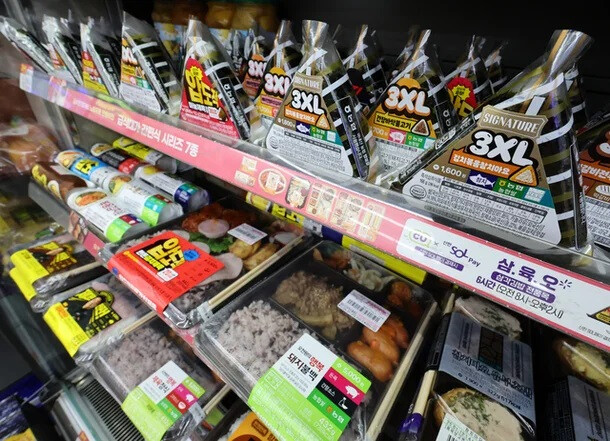
Seoul, South Korea – Kim (38), a resident of Seongbuk-gu, Seoul, recently experienced a moment of dismay during a routine visit to his neighborhood convenience store. Intending to use soon-to-expire CU discount coupons to purchase snacks, he was taken aback by the significantly higher prices compared to the past. "The prices of everyday treats like cup noodles, cola, snacks, and even triangular gimbap have mostly surpassed the ₩1,000 mark, making it hard to enjoy them without feeling the pinch," Kim lamented.
According to convenience store industry sources on the 13th, the prices of Ottogi Jin Ramen (small cup) and Snack Ramen (small cup) at convenience stores rose from ₩1,000 to ₩1,100 starting April 1st. Nongshim's Yukgaejang Bowl Noodle (small cup) and Kimchi Bowl Noodle (small cup) also saw an increase from ₩1,100 to ₩1,200.
The price surge extends to triangular gimbap as well. What used to cost between ₩900 and ₩1,000 now averages around ₩1,500, with some varieties exceeding ₩2,000.
Snack prices are predominantly set at ₩1,700. This includes popular items such as Orion Poca Chip and Kkobuk Chip, Lotte Wellfood Kkokal Corn and Pada Coconut, Binggrae Kkotgerang, Nongshim Meoktaekkang, Banana Kick, and Onion Rings, as well as Haitai Honey Butter Chip and Ace crackers.
Even the cost of chewing gum has become substantial. Lotte Wellfood's Xylitol, Frabo, Juicy Fresh, Fresh Mint, and Spearmint gums are all priced at ₩1,200 each. Ice cream has witnessed an even more dramatic increase. Binggrae Melona, Lotte Wellfood Jaws Bar and Screw Bar, and Haitai Ice Cream Twin Bar now cost ₩1,500, nearly double the price of around ₩800 just three years ago.
Beverages like milk and bottled water are also increasingly difficult to find below the ₩1,000 threshold. Lotte Chilsung Beverage's Let's Be canned coffee, once a budget-friendly option, is now priced at ₩1,200. Coca-Cola and Chilsung Cider 250ml cans have jumped to ₩1,700, while the 350ml versions now cost ₩2,100.
Faced with these escalating prices, consumers are increasingly turning to more affordable private brand (PB) products. GS25 launched its ₩550 Real Beef Ramen (봉지라면) in October of last year, selling over 600,000 units. Their Real Price ice cream, priced between ₩500 and ₩800, has sold more than 2 million units since its introduction in August of the previous year.
CU's ultra-low-priced "Deuktem" (득템 - a Korean term for "lucky find" or "bargain") series has surpassed 60 million units in cumulative sales as of last month. An industry insider commented, "In this era of 'price bomb' inflation, consumers who prioritize value for money are increasingly seeking out PB products."
Further Analysis:
The phenomenon described in the article reflects a broader trend of inflation impacting everyday consumer goods in South Korea. Several factors could be contributing to these price hikes at convenience stores:
Raw Material Costs: Increased global prices for raw materials used in food and beverage production (e.g., wheat, sugar, oil, packaging materials) are likely being passed down to consumers.
Logistics and Transportation Costs: Rising fuel prices and disruptions in global supply chains can lead to higher transportation costs, which are then factored into the final price of goods.
Labor Costs: Minimum wage increases and other labor-related expenses for manufacturers and convenience store operators can contribute to price inflation.
Currency Fluctuations: Weakening of the Korean Won against other major currencies can make imported raw materials and finished goods more expensive.
Increased Demand: Certain popular items might experience price increases due to high demand exceeding supply.
Convenience Store Operating Costs: Rent, utilities, and other operational costs for convenience stores themselves might be rising, leading to price adjustments on products.
The consumer response of gravitating towards private brand products highlights the price sensitivity of the market and the willingness of consumers to opt for more economical alternatives when their purchasing power is constrained. This trend could further incentivize convenience store chains to expand and diversify their private brand offerings to cater to this growing demand for value-oriented products. The success of GS25's Real Beef Ramen and Real Price ice cream, as well as CU's "Deuktem" series, underscores the potential of well-positioned and competitively priced private label goods in the current economic climate.
[Copyright (c) Global Economic Times. All Rights Reserved.]






























